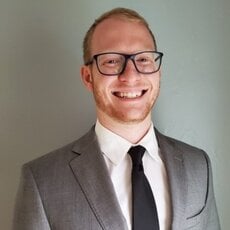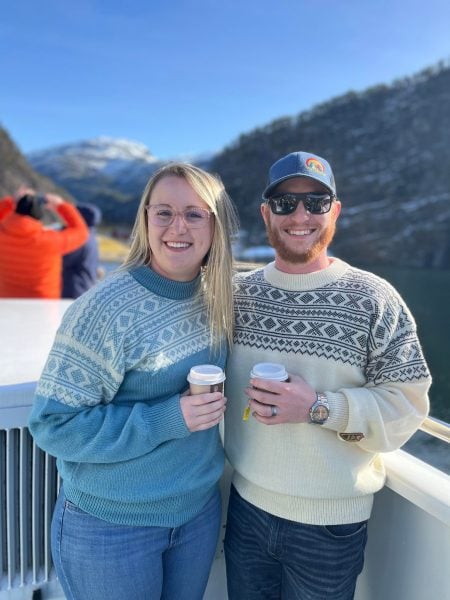Schlorke followed the usual path that many new students take to get into Michigan Tech. Both his parents went to Michigan Tech, as did his sister (computer science), piquing his interest. While he wanted to study nuclear engineering (Tech did not have such a program), it was a place where he could study high energy particle astrophysics, and nuclear physics.
There were lots of things for him to get involved in at Tech and deepen his learning while acquiring important skills. Plus, he liked the flexibility that physics offered for future career prospects. When his interests shifted away from nuclear during school, he decided to augment his passion for physics with an electrical engineering degree too.
A Chemical Attraction to Undergraduate Research
Schlorke was attracted to undergraduate research early in his college career. He is spurred by a drive to learn more about a particular subject that interests him. “I recognized right away that I had a disconnect to applying physics in the real world,” Schlorke said. “Undergraduate research allows you to see physics in action.”
Through a professor of chemistry’s presentation in a physics class, Schlorke found surface sciences to have a lot of common ground with nano-scale physics. He found work as a research assistant under Dr. Kathyrn Perrine. Schlorke learned valuable skills. He hand-drafted, CAD-modeled, and fabricated a substrate fixture and transfer mechanism for use in performing nanoscience and surface-science experimentation in an ultra-high vacuum (UHV).
The substrate fixture included an in-built cryogenic cooling loop and high-temperature Ohmic heating. Testing methods using the equipment varied from infrared laser spectroscopy to field desorption techniques. He performed mechanical modeling of heat transfer, including modeling a sample holder (in a two-stage vacuum) for a thin crystalline structure. He had to show what happens to the mounted sample when moving between reaction stages. “It was really satisfying to see what I designed for Dr. Perrine. To see it come together and see it in action was a lot of fun.”
Pursuing Physics Undergraduate Research
His semester in the Perrine Lab left him wanting more research experiences, particularly in physics. He found an opportunity as an undergraduate research fellow under Dr. Yoke Khin Yap and Dr. Mingxiao Ye. He worked to optimize the synthesis of unique ultra-thin compounds to create a tune-able band gap. A band gap defines the energy for electrons to move to different states and regions in a material. Modifying such a band gap can increase efficiency in solar cell materials and other microcircuits.
Schlorke observes, “As you get materials into these small states, their properties change rapidly- like in microcircuits and solar cells. When you free an electron by exposing it to light in a solar cell, you can improve its efficiency.” In addition to using pulsed laser deposition, Schlorke also worked on chemical vapor depositions and used Michigan Tech’s Scanning Electron Microscope (SEM) and Atomic Force Microscope (AFM) to assess the quality of the layers.
“During my three years in the Yoke Khin Yap Lab, it was satisfying to know my work helped papers to get completed and published. I enjoyed seeing Mingxao earn his PhD. It’s great to know that I am a part of that,” Schlorke said.
Nathan Schlorke’s Advice for Aspiring Undergraduate Physics Researchers
Schlorke offers advice for budding undergraduate researchers. “Get into it early. It gave me so much confidence. Research seems complex and insurmountable; just daunting with technical terms that I didn’t know. But by doing research I was able to ask questions and go deeper than my studies allowed me to go. I gained a whole new perspective.” Schlorke suggests prospective undergraduate researchers find an application that interests them and find out who is doing research in that area. Then seek them out and ask to take part.
Senior Design Project: Can You Design a Rail Gun?
There’s no shortage of opportunities to get involved at Michigan Tech. A senior design project presented an opportunity. There are more than 9000 metric tons- over 100 million tracked particles and pieces. With thousands launches into space each year, the amount of debris will continue to increase. And by 2030 there will be 60,000 satellites flying in this zone. The presence of many satellites and space debris complicates space travel.
As a consultant to a senior design project, Schlorke was challenged to create a system to drag debris into the Earth’s atmosphere so it burns up. Schlorke’s physics experience allowed him to design, model, and present a prototype for an electromagnetic-based launcher for on-satellite use. The launcher could send low-speed expanding foam canisters to catch large sections of debris.
The idea was not selected in the competition, but he used the study and pitched it to the Undergraduate Student Board as a special project- a unique one-on-one project class with professor advisement for credit. One of many ways Michigan Tech allows for truly flexible and unique paths- “if one doesn’t exist- you can make your own.” says Schlorke.
Society of Physics Students: Another Opportunity for Schlorke
The Society of Physics Students was also instrumental in helping Schlorke navigate the physics world. “The Society helped me to understand what physicists did,” he said. “What were the opportunities available to me outside of academia? Through the Society of Physics Students, I further developed communication skills. My leadership role helped me learn how to manage an organization, too. These 21st-century skills apply to the real world.” Plus it made him feel part of a community and was a great way to meet people and get to know them.
Ohm-inous Career Ahead Thanks to Physics
Schlorke recently took a lead technical position at GE Aerospace where he works closely with the US Navy, Air Force, and Army on developing test systems to support the US Military. He attributes his success to his physics training. “Physics is widely recognized (and rightfully so) as rigorous and technically fundamental in what it teaches you,” said Schlorke. “It teaches the core principles of problem-solving. Physics trains you to break down a situation you have never seen before, analyze and compartmentalize it, find a resolution, and explain it to others. Thanks to my BA in Physics I have the confidence and the skills to approach problems that are outside of my comfort zone and general area of knowledge.”
As Schlorke gets deeper into his career, he thinks he is using the skills he developed in physics more than those from engineering. Although he admits there is plenty of cross-over between the two. “The physics program at Tech also teaches you the design, writing, and communication skills you need to be successful,” Schlorke said. “It gave me a wide view of the technical universe; thermodynamics, statistical mechanics, etc.. I learned how to decompose a system. As I go deeper into design, I use more physics skill sets to predict and judge how systems will interact—electrically, thermally, chemically, in many ways.”
Schlorke looks back fondly on his time at Michigan Tech. “The Physics department is a place that challenges you,” he said. “They give you all the resources you could need (and more), but how far you take it is really up to you.” Looks like Schlorke’s career is off to a great start.
About the Physics Department
Physicists at Michigan Technological University help students apply academic concepts to real-world issues. Our physicists take on the big questions to discover how the universe works—from the smallest particles to the largest galaxies. The Physics Department offers three undergraduate degrees and three graduate degrees. Supercharge your physics skills to meet the demands of a technology-driven society at a flagship public research university powered by science, technology, engineering, and math. Graduate with the theoretical knowledge and practical experience needed to solve real-world problems and succeed in academia, research, and tomorrow’s high-tech business landscape.
Questions? Contact us at physics@mtu.edu. Follow us on Facebook, Twitter, and YouTube for the latest happenings. Or read more at the Physics Newsblog.


